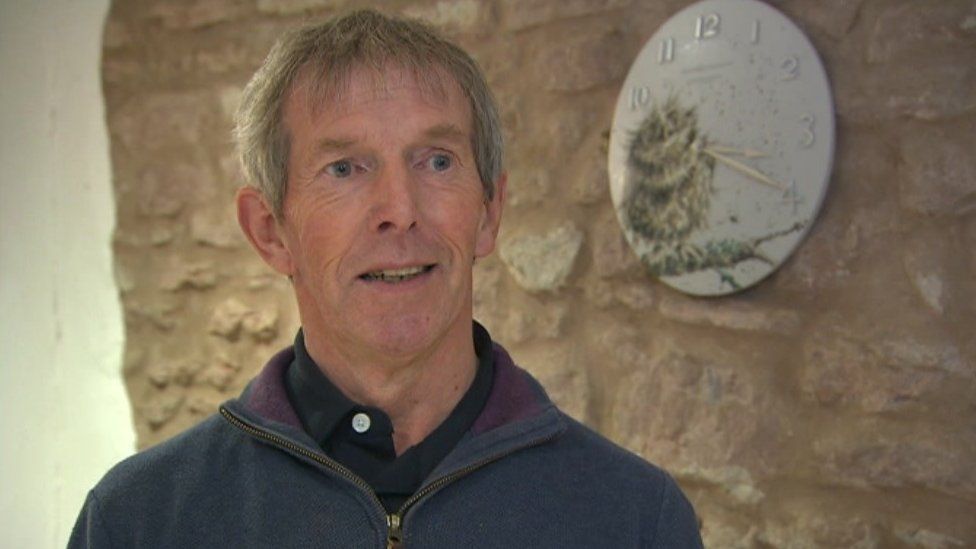Parkinson's disease symptoms 'reversed' by mini implant, trial suggests
- Published

A hospital in Bristol is believed to be the first in the world to implant the smallest device into a brain to reverse the symptoms of Parkinson's disease.
Southmead Hospital surgeons used a tiny deep brain stimulation (DBS) device to override abnormal brain-cell firing patterns caused by Parkinson's.
Tony Howells, the first person to receive the treatment as part of a trial, said the impact was "amazing".
Twenty-five patients have been selected for the trial that concludes next year.
Mr Howells, who had the operation in 2019, said: "Before the operation I went for a walk on Boxing Day with my wife and I got 200 yards (182m) from the actual car.
"I had to turn around and go back because I just couldn't walk."
"Then after the operation, which was 12 months later, I went on Boxing Day again and we went for 2.5 miles (4km) and we could've went further.
"It was amazing," he added.
Currently there is no cure for Parkinson's disease, which leads to parts of the brain becoming progressively damaged over years.
Symptoms include involuntary shaking of parts of the body, slow movement and stiff and inflexible muscles.
Most people develop symptoms when they are over 50 but about 5% of sufferers first experience symptoms when they are under 40.
Traditional operations for Parkinson's involve implanting a fairly large battery into the chest with wires run under the skin through to the top of the head.
The new DBS system, the smallest ever created, involves a tiny battery system for the device implanted into the skull.
It then delivers electrical impulses directly to targeted areas of the brain.
To do so, electric probes are put through the skull and deep into the centre of the brain, into the subthalamic nuclei.
It takes just three hours to carry out the new operation, about half the time it used to with the larger battery.
Mr Howells said: "You can't understand how frustrating [Parkinson's] is until it happens to you.
"Just doing your shoelaces up is a major operation... it affects your every day life no end."
He said being able to play golf again and "do things a lot quicker than I could before" had helped him "no end".
Thoughts on the history, by Matthew Hill, health correspondent
North Bristol Trust has a proud history of pioneering brain surgery to try to alleviate the devastating symptoms of Parkinson's.
Neurosurgeon Steve Gill is the biggest name in this area who has worked tirelessly alongside neurologist Dr Alan Whone.
Ten years ago (in 2012) they helped recruit 42 volunteers living with Parkinson's as part of a £3m trial into how infusing a drug into the brain, called GDNF, could radically change the lives of patients.
The glial-cell derived neurotrophic factor is a naturally occurring protein found in our brains, first linked to treating Parkinson's in 1993 and could restore dopamine production in the brain.
This latest development has the potential to transform the lives of thousands of patients like Tony, but only if the NHS has the resources to carry out the operations.
That's a big question with the current record waits.
Southmead Hospital neurologist Dr Alan Whone said: "There are about 140,000 people living with Parkinson's in the UK and about 14,000 who could benefit from this device if the trial continues to be successful."
He explained: "If you're more elderly, or if you've got memory problems as part of your Parkinson's, this wouldn't be suitable for you.
"But if you're a younger person with Parkinson's, who can have brain surgery and so on, then it becomes much more applicable to that group", he added.
If the treatment is approved by the medical regulator then it could double the number of people who could benefit from it.
Follow BBC West on Facebook, Twitter and Instagram. Send your story ideas to: bristol@bbc.co.uk
Related Topics
- Published15 April 2022
- Published20 September 2021
- Published1 August 2018